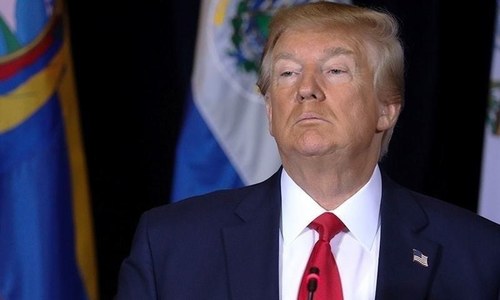WASHINGTON: US President Donald Trump used the last state of the union address of his term to re-stress his pledge to withdraw American troops from Afghanistan, telling his nation on Tuesday night that their forces were not law enforcement agencies for others.
In the small portion devoted to foreign policy issues, Mr Trump took credit for the assassination of Iranian general Qasem Soleimani in Iraq last month, but he also proclaimed his commitment to peace.
“As we defend American lives, we are working to end America’s wars in the Middle East,” he said. “We are working to finally end America’s longest war (in Afghanistan) and bring our troops back home,” he added, earning a warm applause from the audience.
Mr Trump promised to withdraw US troops from Afghanistan during his 2016 election campaign and has made several attempts since then to do so. But he still has about 13,000 troops there, 2,000 more than the Obama administration had left behind when it completed its second tenure.
Noting that the “determination and valor” of American “warfighters” had allowed his administration to make “tremendous progress” in Afghanistan, Mr Trump said he was “not looking to kill hundreds of thousands of people in Afghanistan, many of them totally innocent.”
He also disagreed with those who want American troops to stay in Afghanistan to maintain peace and stability in the war-ravaged country. “It is also not our function to serve other nations as law enforcement agencies,” he said. “These are warfighters that we have — the best in the world — and they either want to fight to win or not fight at all.”
American soldiers had made their contribution and “peace talks are now underway,” said Mr Trump while recommitting himself to his efforts for a negotiated end to the Afghan war.
The Trump administration is engaged in peace talks with the Taliban in Doha, Qatar, and hopes to soon finalise a deal that leads to the withdrawal of US troops from Afghanistan after more than 18 years.
Claiming that US sanctions had crippled the Iranian economy, Mr Trump also reiterated his offer to reengage Iran. “We can help them make a very good and short-time recovery. It can all go very quickly, but perhaps they are too proud or too foolish to ask for that help,” he said. “We are here. Let’s see which road they choose. It is totally up to them.”
Afghanistan, Iran and China were the three major foreign policy issues in Mr Trump’s address, which sounded more like an election speech — dominated heavily by domestic issues and claims of revitalising the American economy. He is seeking reelection in November this year.
As The New York Times pointed out, the president dived into the state of the economy at the top of the speech, making broad declarations about tax cuts, deregulation and the renegotiation of the North American Free Trade Agreement (NAFTA).
Mr Trump also addressed two pieces of potential health care legislation that could lower medical bills and the price of prescription drugs.
Referring to the tariffs he imposed on China recently, Mr Trump claimed that his “strategy has worked” and jobs were returning to the United States. He also warned Americans that socialism was knocking on their doors.
Published in Dawn, February 6th, 2020















































